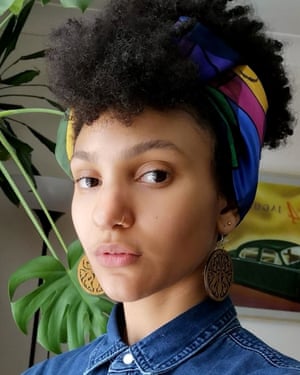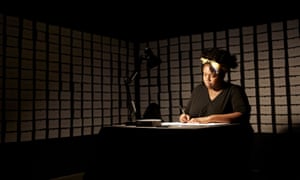Fringe of Colour Films: ‘the diversity checklist is discarded first in a crisis’ | Stage
[ad_1]
‘You can’t just keep pulling up chairs,” says a character in Joshua Harmon’s play Admissions. “There isn’t unlimited room. That’s, like, not how tables work.” The speech suggests the impracticalities of inviting new voices to a table of privilege – as somebody will eventually have to give up their seat. Despite this talk on the plight of black people being performed by an all-white cast – prompting the few black audience members to search each other out and exchange “the look” – the quote has stayed with me.
I was reminded of it when Jessica Brough, the founder of Fringe of Colour, wrote an editorial introducing the initiative’s new online arts festival, Fringe of Colour Films. It will include a series of conversations called This Sh*t Is for Us featuring speakers from community-based projects with novel approaches to expression, care and solidarity. It’s a nod to Solange’s 2016 album A Seat at the Table, which encourages people of colour to create their own tables, instead of waiting for a seat at those that have been historically cordoned off. “We were thinking about what else we could do that spotlighted the work and brought in people we could learn from,” says Brough. “There’s so much potential in meeting people online from around the world.”

Brough moved to Edinburgh in 2016 to study for a master’s and later PhD in psychology. That summer, Brough went for the first time to the Edinburgh fringe, the world’s largest arts festival. “Living in Edinburgh, you notice how white a city is. I felt really excited when the fringe came around because I knew there were going to be other black and brown people in the city.” But Brough noticed the shows were distinctly lacking in diversity. “I was looking for work by black performers and finding it really difficult.”
Inspired by other people organising their own fringe experience, Brough compiled a spreadsheet of the shows made by – or predominately featuring – artists of colour. In summer 2018, they created the Fringe of Colour initiative, a publicly available spreadsheet to promote black and brown performers. By 2019, it had grown into a free ticket scheme for young people of colour.
Carrying the responsibility of managing an unfunded ticket scheme took an emotional toll on Brough, despite support from the Fringe Society. Their experience revealed the need to overhaul a system that requires those systematically shut out, to “fix it” from within.
With this summer’s Edinburgh fringe cancelled because of Covid-19, Brough wondered if maybe they’d get a summer break this year. “No fringe, no Fringe of Colour, right?” But Brough quickly changed their thinking: “The industry has been so bleak and sad – with so many missed opportunities and [the loss of] paid work.” There is a fear that the last few months will undo the small gains made in ethnic diversity over the last two decades. “The kind of work getting commissioned [during the crisis] meant we were just going to have the same issues but on a worse scale, where people of colour are considered add-ons to white institutions to tick the diversity checklist. The checklist gets discarded first in a crisis. We were trying to think of ways to create paid work for people and work that would open them up to audiences.”

Knowing that artists would have to move their work online, Fringe of Colour launched a streaming platform for its August festival, featuring more than 40 filmed performance art pieces by and for people of colour. Each week, two new commissioned films will be released. This week’s commissions are WPAU by comedian Athena Kugblenu, about Black Lives Matter being as much of a no-brainer as the unreasonableness of egg mayonnaise sandwiches. The other is Category Mistake by performance artist Mandla Rae, who seamlessly weaves their mother tongue into a monologue about living a “sinful life”. Fringe of Colour Films also include submissions that range from a hilariously relatable play about a Zoom support group on black women dating white men, to a Fringe of Colour co-production with performance artist Selina Thompson called Race Cards, a three-hour and 43-minute immersive piece; a series of eight poetry films put together by Scottish poet Hannah Lavery called Sorry I Was on Mute and a platform for written responses to some of the performances.
From the rubble created by Covid-19 have emerged altruistic ways to make the arts more accessible. Brough thinks an online festival “works in this present moment with what people need, want and the safety of the situation – we’re not putting anyone’s health at risk – but equally, I think it has a place in the long-term.” In Edinburgh, Brough says, “there are so many groups of people who can’t attend either because it’s too expensive, it’s too far away, there are too many cobbles and steps that you can’t get around if you’ve got mobility issues – there’s something to be said about performers and creatives rethinking how they make and archive their work.”
Grassroots projects such as Fringe of Colour Films aren’t about just filling a gap while the Edinburgh fringe is away, but creating new ways to engage with art in the future.
• Part one of This Sh*t Is for Us is on YouTube; part two takes place on 22 August. Fringe of Colour Films continues until 31 August.